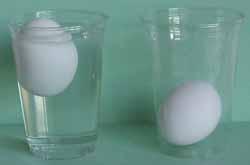Hi,
This Kids Science Newsletter includes a question of the month, current science events, science trivia and a simple science experiment.
Question of the Month
How are hurricanes, typhoons and cyclones similar and different?
(answer follows the simple science experiment)
Science Current Events
- Tail Walking Dolphin Teaches Others
- A dolphin that was briefly held at a marine park learned the trick of tail walking. Since being released into the wild again the dolphin taught another female dolphin how to tail walk. Other dolphins in the area are now learning how to do the trick. It is believed the dolphins do the trick just for fun. It is similar to us dancing or doing gymnastics.
- Super Typhoon Megi
- Super Typhoon Megi was a Category 5 storm when it smashed into the Philippines on October 18. It had gusts of winds over 160 miles per hour, making the typhoon the strongest of the year. It was the strongest storm to hit the Philippines in years. It rebuilt its strength as it headed across the South China Sea to China where it made landfall twice causing millions of dollars in damage.
- Mount Merapi's Trio of Eruptions
- Pyroclastic flows sweeping down the volcano's flanks with super heated gases swept over homes only 8 minutes after the initial eruption. More than 15,000 people had refused to leave their homes after being warned about a possible eruption in the very near future. The volcano located on Java is one of the most dangerous in the world. It has produced more lava flows than just about any other volcano in the world.
- Last Year's Moon Shot Splashed Up Water
- NASA blasted a hole in Moon last year hoping to find enough water to sustain life if man goes back to the Moon to set up observatories or as a base for space travel. Scientists hope to find enough water on the moon for drinking and to possibly make rocket fuel.
Science Trivia
- The planet Venus spins backwards as it travels around the Sun. Sunrise on Venus is in the west and sunset is in the east.
- Diamonds can be turned into vapor if you heat them to 1405 degrees Fahrenheit.
- Antarctica is essentially a desert because it has only about two inches of percipitation each year.
- Ants can carry 50 times their own weight. If you were as strong as an ant you could carry a small car.
- Noodles have been found in ancient ruins in China that are 4000 years old.
- Los Angeles was first settled by the Spaniards. Its full name is El Pueblo de Nuestra Senora la Reina de Los Angeles de Porciuncula. You can abbreviate its name to 3.63% of its size and just call it LA.
- The average $100 bill is in circulation for 9 years before needing to be replaced.
- It would take about 33 million people holding hands to circle the Earth at the equator.
Simple Science Activity
Floating Eggs
Introduction
In this experiment you will learn how to float fresh eggs. Did you know that fresh eggs float while rotten eggs sink. That is a test to see if an egg you want to eat is fresh.

Materials
- Fresh egg
- Water glass
- Water
- Salt
- Tablespoon
Directions
- Fill a glass a little over half full of tap water.
- Carefully place an egg in the glass. If it is fresh it should sink to the bottom of the glass.
- Remove the egg from the glass and begin stirring in salt.
- Continue adding salt until the solution is supersaturated and no more salt can be dissolved in the water.
- Carefully place the fresh egg into the glass, it should float.
- If it does not float try the experiment again using warmer water that will absorb more salt than cold water.
Science behind the experiment
Fresh eggs are denser than fresh tap water so they sink. The salt that you added to the water made it denser. The density of the salty water gives it more lifting power so the fresh egg floats.
Answer to the question of the month
How are hurricanes, typhoons and cyclones similar and different?
If you said they athey were the same storm only in different parts of teh world you are correct. In the Atlantic and eastern Pacific Oceans (west of the international dateline) tropical storms are called typhoons. The name typhoon probably comes from the Chinese word ty-fung meaning big wind. In the Indian Ocean and the Bay of Bengal these same tropical storms are called cyclones. The Australians call hurricanes and dust devils Willy Willys.
More Fun and Interesting Web Pages
Fun and interesting pages on our website
- Pyroclastic Flows
- Find out more about pyroclastic flows that travel down the sides of volcanoes at hurricane speed destroying every thing in their path.
- The Krakatoa Eruption
- Find out more about the Krakatoa Eruption and the pyroclastic flows that swept about the oceans to other islands and the tsunamis that killed untold numbers of people.
- Elementary Science Activities, Dancing Raisins
- In this fun and easy activity you can watch raisins dancing in a glass!
- Easy Science Project, Orbiting Together
- Create a model of how the Earth and the Moon orbit the Sun.
Share the newsletter
Please feel free to share this newsletter with a friend by forwarding it to them. If you know of a group or other person who might enjoy the newsletter please let them know about it also.
Comments? Ideas? Feedback? I'd love to hear from you. Just reply to this Kids Science Newsletter and tell me what you think!
Sincerely yours,
Myrna Martin
Websites:
www.RingofFireScience.com
www.Kids-Fun-Science.com
|



